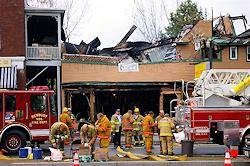If there is a fire, he receives money for the damage to the building and the lost rent, but you don’t receive anything for your personal articles lost in the fire.
Almost every landlord has a section suggesting you purchase tenants insurance in their lease and some insist that you purchase a tenants insurance policy if you live in their apartment or house.
When you purchase tenants insurance you purchase two types of insurance. One part is personal property insurance and the other covers you if you or your guests cause damage to the building or personal injury to another.

While tenants insurance companies won’t pay for malicious damage such as intentionally knocking holes in walls, it does pay for damage to a building caused by an accident. For instance, if you’re child played with matches and caught the building on fire, you could be held responsible for the damage. Even though the landlord might not take you to court, his insurance company could sue you to recover the damages they pay.
Ask for quotes on a tenants insurance policy that covers ‘all perils’. These policies cover 17 perils such as fire, smoke, vandalism and wind damage. While even these tenants insurance don’t cover floods or earthquakes, you can purchase a separate policy or add a rider to your renters insurance policy to cover those perils.
When looking for the right tenants insurance policy, consider the cost of replacing your items. The only time most people notice how many “things” they have is when they move. Even though it’s a busy time, it’s also a good time to snap a few pictures as you pack or unpack. Write down approximate cost of your items and then total it. This gives you an approximate amount of insurance for your needs and gives a visual to present to the insurance company if there’s a loss. Don’t forget to email the pictures to yourself. That way they’ll be safely stored online even if a fire or tornado destroys your computer. Purchase a tenants insurance policy with replacement cost. Most tenant policies use the price of the item as the base for reimbursement then reduce the amount by a specified percentage based on the item’s age. This could mean you’d only receive $75 for your $500 stereo.
Investigate the potential need for scheduled personal property when you purchase renters insurance. Insurance companies have a ceiling on the amount they pay for specific items such as jewelry or electronic equipment. If you have a particularly high priced item, check the fine print to see if it costs more than the policy pays.
With scheduled personal property, you can increase the limits on a group of items or simply schedule one item. You might have a collection of jewelry that is over the limit the company pays but no one particular item of an extremely high price. You can purchase increased coverage for jewelry. The other type of rider covers one high-priced item, such as a diamond ring. It requires an appraisal and sometimes a picture to insure it to value on a schedule.
Make sure the policy you purchase offers enough liability if you cause a major fire or if someone injures himself or herself at your home and sues you. tenants insurance is relatively inexpensive and the cost of increasing the liability might be only pennies a month but it could make a huge difference if there’s a problem.
Compare policies for additional living expense. While you might be able to secure another apartment immediately, often that’s not the case, particularly for a few weeks after a fire. Tenants insurance has a section that covers additional living expense. It pays a specified daily amount if you have to stay at a Holiday Inn or other hotel for a few nights until you find an apartment again. Sometimes, the damage is minor enough, you can move back in within a few weeks after the repairs are complete. No one but a week-by-week or day by day hotel would rent to you under those conditions and your out of pocket cost is likely to be quite high. Check the price of hotel rooms in your area and compare it to the coverage offered in the tenants insurance policies.
If you’ve compared coverage and everything is the same, compare the financial strength of the company and customer ratings. The Department of Insurance for your state often has customer complaints on their website. It’s a good place to start. If all things are equal, cheaper is always better. Companies set their rates based on losses in your area, income from investments and the expenses the company incurs from doing business. Some companies have higher costs of doing business than others. You can find cheap contents insurance rates with the same coverages from some companies who do a better job of holding their expenses down as compared to their competitors.